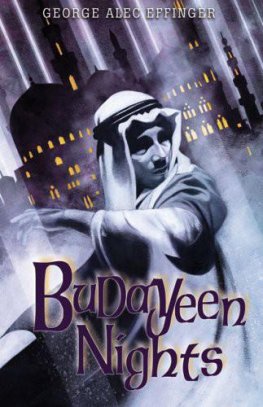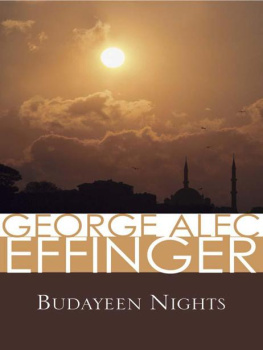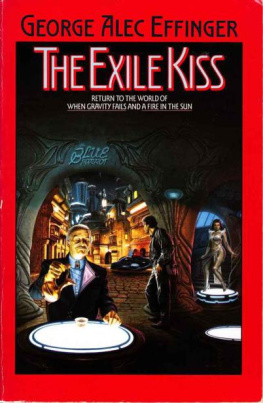A Fire in the Sun
by George Alec Effinger
My grandfather, George Conrad Effinger, whom I never knew, was a police officer in the city of Cleveland during the Depression. He was killed in the line of duty. This book is dedicated to his memory, growing fainter now each year in the minds of those people who did know him, except for his policemans shield, Badge #374, hung with pride in a station house in Cleveland.
Children begin by loving their parents; after a time they judge them; rarely, if ever, do they forgive them.
Oscar Wilde,
The Picture of Dorian GrayWed ridden for many days out the coast highway toward Mauretania, the part of Algeria where Id been born. In that time, even at its lethargic pace, the broken-down old bus had carried us from the city to some town forsaken by Allah before it even learned what its name was. Centuries come, centuries go: In the Arab world they arrive and depart loaded on the roofs of shuddering, rattling buses that are more trouble to keep in service than the long parades of camels used to be. I remembered what those bus rides were like from when I was a kid, sitting or standing in the aisle with fifty other boys and men and maybe another two dozen clinging up on the roof. The buses passed by my home then. I saw turbaned heads, heads wearing fezes or knit caps, heads in white or checked keffiyas. All men. That was something I planned to ask my father about, if I ever met him. O my father, I would say, tell me why everyone on the bus is a man. Where are their women?
And I always imagined that my father I pictured him tall and lean with a fierce dark beard, a hawk or an eagle of a man; he was, in my vision, Arab, although I had my mothers word that he had been a Frenchman I saw my father gazing thoughtfully into the bright sunlight, framing a careful reply to his young son. O Marid, my sweet one, he would say and his voice would be deep and husky, issuing from the back of his throat as if he never used his lips to speak, although my mother said he wasnt like that at all Marid, the women will come later. The men will send for them later.
Ah, I would say. My father could pierce all riddles. I could not pose a question that he did not have a proper answer for. He was wiser than our village shaykh more knowledgeable than the man whose face filled the posters pasted on the wall we were pissing on. Father, I would ask him, why are we pissing on this mans face?
Because it is idolatrous to put his face on such a poster, and it is fit only for a filthy alley like this, and therefore the Prophet, may the blessing of Allah be on him and peace, tells us that what we are doing to these images is just and right.
And Father? I would always have one more question, and hed always be blissfully patient. He would smile down at me, put one hand fondly behind my head. Father? I have always wanted to ask you, what do you do when you are pissing and your bladder is so full it feels like it will explode before you can relieve it and while you are pissing, just then, the muezzin
Saied hit me hard in the left temple with the palm of his hand. You sleeping out here?
I looked up at him. There was glare everywhere. I couldnt remember where the hell we were. Where the hell are we? I asked him.
He snorted. Youre the one from the Maghreb, the great, wild west. You tell me.
Have we got to Algeria yet? I didnt think so.
No, stupid. Ive been sitting in that goddamn little coffeehouse for three hours charming the warts off this fat fool. His name is Hisham.
Where are we?
Just crossed through Carthage. Were on the outskirts of Old Tunis now. So listen to me. Whats the old guys name?
Huh? I dont remember.
He hit me hard in the right temple with the palm of his other hand. I hadnt slept in two nights. I was a little confused. Anyway, he got the easy part of the job: Sitting around the bus stops, drinking mint tea with the local ringleaders and gossiping about the marauding Christians and the marauding Jews and the marauding heathen niggers and just in general being goddamn smooth; and I got the piss-soaked alleys and the flies. I couldnt remember why we divided this business up like that. After all, I was supposed to be in charge it was my idea to find this woman, it was my trip, we were using my money. But
Saied took the mint tea and the gossip, and I got well, I dont have to go into that again.
We waited the appropriate amount of time. The sun was disappearing behind a western wall; it was almost time for the sunset call to prayer. I stared at Saied, who was now dozing. Good, I thought, now I get to hit him in the head. I had just gotten up and taken one little step, when he looked up at me. Its time, I guess, he said, -yawning. I nodded, didnt have anything to add. So I sat back down, and Saied the Half-Hajj went into his act.
Saied is a natural-born liar, and its a pleasure to watch him hustle. He had the personality module he liked best plugged into his brain his heavy-duty, steel-belted, mean mother of a tough-guy moddy. Nobody messed with the Half-Hajj when he was chipping that one in.
Back home in the city, Saied thought it was beneath him to earn money. He liked to sit in the cafes with me and Mahmoud and Jacques, all day and all evening. His little chicken, the American boy everybody called Abdul-Hassan, went out with older men and brought home the rent money. Saied liked to sneer a lot and wear his gal-lebeya cinched with a wide black leather belt, which was decorated with shiny chrome-steel strips and studs. The Half-Hajj was always careful of his appearance.
What he was doing in this vermin-infested roadside slum was what he called fun. I waited a few minutes and followed him around the corner and into the coffeehouse. I shuffled in, unkempt, filthy, and took a chair in a shadowy corner. The proprietor glanced at me, frowned, and turned back to Saied. Nobody ever paid any attention to me. Saied was finishing the tail end of a joke Id heard him tell a dozen times since wed left the city. When he came to the payoff, the shopkeeper and the four other men at the long counter burst into laughter. They liked Saied. He could make people like him whenever he wanted. That talent was programmed into an add-on chip snapped into the badass moddy. With the right moddy and the right daddy chips, it didnt matter where youd been born or how youd been raised. You could fit in with any sort of people, you could speak any language, you could handle mrself in any situation. The information was fed directly to your short-term memory. You could literally become another person, Ramses II or Buck Rogers in the 25th century, until you popped the moddy and daddies out.
Saied was being rough and dangerous, but he was also being charming, if you can imagine that combination. I watched the shop owner reach and grab the teapot. He poured some into the Half-Hajjs glass, slopping some more on the wooden counter. Nobody moved to mop it up. Saied raised the glass to drink, then slammed it down again. Yaa salaam! he roared. He leaped up.
What is it, O my friend? asked Hisham, the proprietor.
My ring! Saied shouted. He was wearing a large gold ring, and hed been waving it under the old mans nose for two solid hours. It had had a big, round diamond in its center.
Whats the matter with your ring?
Look for yourself! The stone my diamond its gone!
Hisham caught Saieds flapping arm and saw that, indeed, the diamond was now missing. Must have fallen out, the old man said, with the sort of folk wisdom you find only in these petrified provincial villages.
Yes, fallen out, said Saied, not calmed in the least. But where?
Do you see it?
Saied made a great show of searching the floor around his stool. No, Im sure its not here, he said at last.




